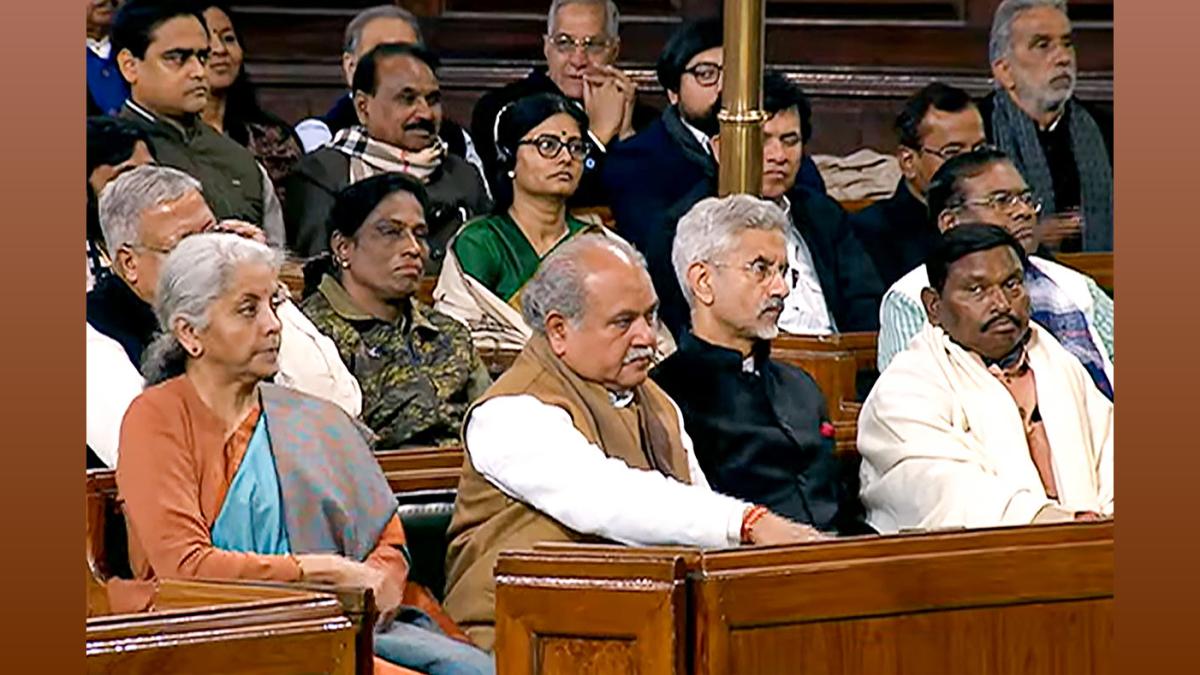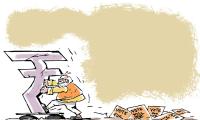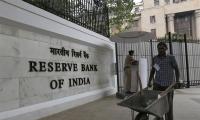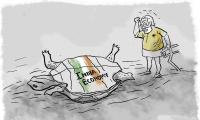India GDP Growth Forecast 6.5-7%, Economic Survey 2024
India's Economic Survey forecasts 6.5-7% GDP growth, highlights job creation, Chinese investment, and inflation concerns.

Photograph: PTI Photo
New Delhi, Jul 22 (PTI) The government's pre-Budget Economic Survey on Monday set a conservative growth forecast of 6.5 to 7 per cent for the current fiscal as it flagged the need for creating more jobs in the economy and backed more Chinese direct investments to boost exports.
The report, which is authored by the chief economic adviser's office, favoured considering targeting inflation that excludes food, the prices of which are influenced more by supply than demand.
It sounded a bell of caution on the soaring stock markets, saying retail investor participation has increased significantly and there are chances of speculations due to overconfidence and expectations of greater returns.
The Survey, tabled by Finance Minister Nirmala Sitharaman in Parliament, projected a 6.5 per cent to 7 per cent GDP growth rate in the current fiscal year that started in April. This is lower than 8.2 per cent growth seen in the previous 2023-24 (April 2023 to March 2024) fiscal and below than RBI's 7.2 per cent estimate for current fiscal.
"The Indian economy is on a strong wicket and stable footing, demonstrating resilience in the face of geopolitical challenges," Chief Economic Adviser V Anantha Nageswaran wrote in the preface to the annual report card on the state of the economy.
He, however, hastened to add that fears of cheaper imports from countries with excess capacity could limit the formation of private capital.
Acknowledging that this year's forecast was on the conservative side, and lower than market expectations, the Survey cited slower investment growth by the private sector as well as uncertain weather patterns as some of the reasons for caution.
For the medium-term, it saw a potential of 7 per cent-plus growth rate on a sustained basis if structural reforms are implemented.
The report, that came just a day before Sitharaman presents the Budget for 2024-25 that is likely to layout the economic priorities of the Modi 3.0 government and the vision for a developed nation by 2047, identified boosting private investment, strengthening small businesses and agriculture, raising financial resources for climate change adaptation, easing red tap for small businesses, and tacking income inequality as focus areas.
Priorities should also include bridging the gap between education and employment, it said, calling for expediting implementation of labour reforms to create a more conducive environment for job creation.
"The Indian economy needs to generate an average of nearly 7.85 million jobs annually until 2030 in the non-farm sector to cater to the rising workforce," the report said.
In the preface to the Survey, the CEA said job creation happens mainly in the private sector. "Second, many (not all) of the issues that influence economic growth, job creation and productivity and the actions to be taken therein are in the domain of state governments."
"So, in other words, India needs a tripartite compact, more than ever before, to deliver on the higher and rising aspirations of Indians and complete the journey to Viksit Bharat by 2047," he said.
He termed Prime Minister Narendra Modi coming to power for a third time as an "unprecedented third popular mandate" that "signals political and policy continuity" and in the same breath stated that "letting go is part of good governance".
"The Indian state can free up its capacity and enhance its capability to focus on areas where it has to by letting go of its grip in areas where it does not have to," he said. "The Licensing, Inspection and Compliance requirements that all levels of the government continue to impose on businesses is an onerous burden. Relative to history, the burden has lightened. Relative to where it ought to be, it is still a lot heavier."
The Survey called for boosting direct investment from China while reducing imports from that country.
Amid strained ties since 2020 after border skirmishes, the report said to boost exports, India can either integrate into China's supply chain or promote foreign direct investment from China.
"Among these choices, focusing on FDI from China seems more promising for boosting India's exports to the US, similar to how East Asian economies did in the past," it said, adding choosing the FDI strategy "appears more advantageous than relying on trade" as it can arrest the growing trade deficit India has with China.
Following the 2020 clashes in the Galwan Valley, India banned over 200 Chinese mobile apps such as TikTok, and rejected a major investment proposal from EV maker BYD. Visas for Chinese nationals also slowed.
On inflation, the Survey said the short-term inflation outlook is benign. It favoured Reserve Bank of India's monetary policy framework, considering to tame inflation excluding food and using it to set interest rates.
Currently, the central bank is mandated to keep consumer price index-based inflation at 4 per cent with a tolerance band of 2 percentage points on either side.
CPI inflation in June stood at 5.08 per cent but demand-driven core inflation, which leaves out food and fuel prices, was around 3 per cent.
And to keep CPI inflation bring down below 4 per cent has led to RBI holding interest rates for eight straight bimonthly meetings.
The Survey said hardships caused by higher food prices for poor and low-income consumers can be handled through coupons or direct benefit transfer (DBT).
It also flagged a rise in mental health issues among Indians, saying it drags down productivity and needs to be paid attention to.
It also said that the advent of Artificial Intelligence (AI) casts a "huge pall of uncertainty" with regard to impact on workers across all skill levels.
Nageswaran in the preface to the Survey called for the need for policy re-orientation of farm policies despite existing subsidies and support measures.
The report, which is authored by the chief economic adviser's office, favoured considering targeting inflation that excludes food, the prices of which are influenced more by supply than demand.
It sounded a bell of caution on the soaring stock markets, saying retail investor participation has increased significantly and there are chances of speculations due to overconfidence and expectations of greater returns.
The Survey, tabled by Finance Minister Nirmala Sitharaman in Parliament, projected a 6.5 per cent to 7 per cent GDP growth rate in the current fiscal year that started in April. This is lower than 8.2 per cent growth seen in the previous 2023-24 (April 2023 to March 2024) fiscal and below than RBI's 7.2 per cent estimate for current fiscal.
"The Indian economy is on a strong wicket and stable footing, demonstrating resilience in the face of geopolitical challenges," Chief Economic Adviser V Anantha Nageswaran wrote in the preface to the annual report card on the state of the economy.
He, however, hastened to add that fears of cheaper imports from countries with excess capacity could limit the formation of private capital.
Acknowledging that this year's forecast was on the conservative side, and lower than market expectations, the Survey cited slower investment growth by the private sector as well as uncertain weather patterns as some of the reasons for caution.
For the medium-term, it saw a potential of 7 per cent-plus growth rate on a sustained basis if structural reforms are implemented.
The report, that came just a day before Sitharaman presents the Budget for 2024-25 that is likely to layout the economic priorities of the Modi 3.0 government and the vision for a developed nation by 2047, identified boosting private investment, strengthening small businesses and agriculture, raising financial resources for climate change adaptation, easing red tap for small businesses, and tacking income inequality as focus areas.
Priorities should also include bridging the gap between education and employment, it said, calling for expediting implementation of labour reforms to create a more conducive environment for job creation.
"The Indian economy needs to generate an average of nearly 7.85 million jobs annually until 2030 in the non-farm sector to cater to the rising workforce," the report said.
In the preface to the Survey, the CEA said job creation happens mainly in the private sector. "Second, many (not all) of the issues that influence economic growth, job creation and productivity and the actions to be taken therein are in the domain of state governments."
"So, in other words, India needs a tripartite compact, more than ever before, to deliver on the higher and rising aspirations of Indians and complete the journey to Viksit Bharat by 2047," he said.
He termed Prime Minister Narendra Modi coming to power for a third time as an "unprecedented third popular mandate" that "signals political and policy continuity" and in the same breath stated that "letting go is part of good governance".
"The Indian state can free up its capacity and enhance its capability to focus on areas where it has to by letting go of its grip in areas where it does not have to," he said. "The Licensing, Inspection and Compliance requirements that all levels of the government continue to impose on businesses is an onerous burden. Relative to history, the burden has lightened. Relative to where it ought to be, it is still a lot heavier."
The Survey called for boosting direct investment from China while reducing imports from that country.
Amid strained ties since 2020 after border skirmishes, the report said to boost exports, India can either integrate into China's supply chain or promote foreign direct investment from China.
"Among these choices, focusing on FDI from China seems more promising for boosting India's exports to the US, similar to how East Asian economies did in the past," it said, adding choosing the FDI strategy "appears more advantageous than relying on trade" as it can arrest the growing trade deficit India has with China.
Following the 2020 clashes in the Galwan Valley, India banned over 200 Chinese mobile apps such as TikTok, and rejected a major investment proposal from EV maker BYD. Visas for Chinese nationals also slowed.
On inflation, the Survey said the short-term inflation outlook is benign. It favoured Reserve Bank of India's monetary policy framework, considering to tame inflation excluding food and using it to set interest rates.
Currently, the central bank is mandated to keep consumer price index-based inflation at 4 per cent with a tolerance band of 2 percentage points on either side.
CPI inflation in June stood at 5.08 per cent but demand-driven core inflation, which leaves out food and fuel prices, was around 3 per cent.
And to keep CPI inflation bring down below 4 per cent has led to RBI holding interest rates for eight straight bimonthly meetings.
The Survey said hardships caused by higher food prices for poor and low-income consumers can be handled through coupons or direct benefit transfer (DBT).
It also flagged a rise in mental health issues among Indians, saying it drags down productivity and needs to be paid attention to.
It also said that the advent of Artificial Intelligence (AI) casts a "huge pall of uncertainty" with regard to impact on workers across all skill levels.
Nageswaran in the preface to the Survey called for the need for policy re-orientation of farm policies despite existing subsidies and support measures.
You May Like To Read
TODAY'S MOST TRADED COMPANIES
- Company Name
- Price
- Volume
- Vodafone-Idea-L
- 11.57 ( -0.69)
- 53189417
- AvanceTechnologies
- 1.16 (+ 4.50)
- 30291566
- Mehai-Technology
- 1.69 ( -2.31)
- 25791418
- Sunshine-Capital
- 0.27 ( 0.00)
- 20115117
- Harshil-Agrotech
- 0.60 ( -1.64)
- 18554997





